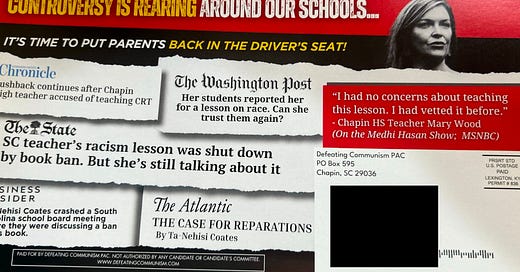Updates: this piece has been updated to reflect a statement from Mary Wood. Huddle, Baynham, and Loveless have not responded to requests for comment. In addition, it has been updated to reflect Moms for Liberty’s formal endorsement of Catherine Huddle and Jayson Baynham on its national website.
English teacher Mary Wood made national headlines last year when students in her AP Language and Composition class complained that she was teaching Ta-Nehisi Coates’ Between the World and Me, and that by doing so she was somehow violating a vague proviso based on a defunct Trump administration Executive Order, which has was originally introduced by members of the South Carolina Freedom Caucus. The proviso, which uses language originally intended to prevent federal employees from being required to complete diversity training, has been renewed for the past several years in the state budget.
While the book has not yet been banned statewide in South Carolina, Lexington- Richland School District 5 to…
Keep reading with a 7-day free trial
Subscribe to Other Duties (as assigned) to keep reading this post and get 7 days of free access to the full post archives.



